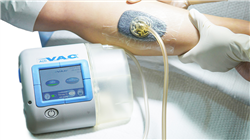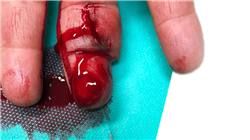University certificate
The world's largest faculty of nursing”
Description
Through this Relearning-based Postgraduate diploma, you will master the technique of Enzymatic Debridement and promote healing of Surgical Wounds”

Patient education and the prevention of complications have become fundamental pillars for the optimal management of surgical wounds. As an integral part of the clinical care team, nurses have the responsibility to educate patients on proper wound care, as well as preventive measures to avoid infections and other complications. For this reason, these professionals must stay at the forefront of the most cutting-edge strategies to promote the healing process, strengthen the immune system, and reduce the possibility of complications.
To support them in this task, TECH presents a revolutionary Postgraduate diploma in Nursing Care in Surgical Wounds. Under a practical approach, the academic itinerary will deepen in the early recognition of the signs of wounds.
In this way, professionals will be able to intervene quickly to prevent major complications such as dehiscence or necrosis. Likewise, the syllabus will delve into wound treatments, including wound cleaning, use of antibiotics and use of bandages. In line with this, the didactic materials will explore how sophisticated Negative Pressure Therapy contributes to provide the oxygen and nutrients essential for wound healing.
Regarding the methodology of this program, TECH offers a 100% online educational environment, which allows nurses to combine their studies with the rest of their regular responsibilities. Likewise, it employs its disruptive Relearning system, based on the repetition of key concepts to fix knowledge and facilitate learning. The only requirement is that professionals have a device with Internet access, including their own cell phone. In this way, they will be able to enter the Virtual Campus to enjoy an educational experience that will elevate their career horizons to a higher level. In addition, the program will feature the participation of a distinguished International Guest Director, who will give comprehensive master classes to delve into the latest innovations in Care in Surgical Wounds.
A prestigious International Guest Director will give several Masterclasses to discuss the latest advances in Negative Pressure Therapy”
This Postgraduate diploma in Nursing Care in Surgical Wounds contains the most complete and up-to-date scientific program on the market. The most important features include:
- The development of practical cases presented by experts in Wound Care
- The graphic, schematic and eminently practical contents with which it is conceived gather scientific and practical information on those disciplines that are indispensable for professional practice
- Practical exercises where self-assessment can be used to improve learning.
- Its special emphasis on innovative methodologies
- Theoretical lessons, questions to the expert, debate forums on controversial topics, and individual reflection assignments
- Content that is accessible from any fixed or portable device with an Internet connection
You will delve into Wound Bed Preparation, which will help to prevent infections that could complicate healing and prolong recovery time”
The program’s teaching staff includes professionals from the sector who contribute their work experience to this program, as well as renowned specialists from leading societies and prestigious universities.
The multimedia content, developed with the latest educational technology, will provide the professional with situated and contextual learning, i.e., a simulated environment that will provide immersive education programmed to learn in real situations.
This program is designed around Problem-Based Learning, whereby the professional must try to solve the different professional practice situations that arise during the course. For this purpose, students will be assisted by an innovative interactive video system created by renowned and experienced experts.
Do you want to incorporate the most advanced pharmacological strategies to manage pain during Negative Pressure Therapy into your daily practice? Get it with this degree"

TECH's 100% online methodology will allow you to update without interrupting your professional work"
Syllabus
Through this program, nurses will have a holistic understanding of the processes that affect surgical wound healing. The syllabus will delve into the identification and evaluation of wounds, which will enable professionals to make accurate diagnoses. In this sense, the syllabus will delve into advanced treatments such as Negative Pressure Therapy, Hyperbaric Oxygen or Laser Therapy. In addition, the didactic materials will offer the keys to manage complications of Surgical Wounds, highlighting the importance of hematoma drainage to relieve patients' pain and accelerate their recovery.

You will implement the most innovative strategies to prevent and manage common Surgical Wound complications, such as infection or poor healing”
Module 1. Skin Wound Management for Nursing
1.1. Injury Evaluation
1.1.1. Wound Identification and Assessment
1.1.2. Recognition of Early Signs of Wounds
1.1.3. Wound Assessment Tools
1.1.4. Documentation and Monitoring of Wound Progression
1.2. Wound Cleaning: Techniques
1.2.1. Enzymatic Debridement
1.2.2. Exudate Management
1.2.3. Stimulation of Granulation: Negative Pressure Therapy, Growth Factors and Hyperbaric Oxygen
1.2.4. Wound Bed Protection
1.3. Wounds According to Typology
1.3.1. Acute Wounds: Cuts, Burns and Fractures
1.3.2. Chronic Wounds: Pressure, Venous and Diabetic Ulcers
1.3.3. Surgical Wounds: Incisions, Excisions, Sutures
1.3.4. Traumatic Wounds: Abrasions, Contusions, Lacerations
1.4. Treatment and Care of Wounds
1.4.1. Advanced Therapies: Negative Pressure Therapy, Hyperbaric Oxygen, Laser Therapy
1.4.2. Pain Management
1.4.3. Wound Follow-Up and Evaluation
1.5. Wound Care in Humid Environment (CAH) and TIMEConcept
1.5.1. Principles of CAH Contraindications
1.5.2. TIME: Non-Viable Tissue, Infection or Inflammation, Wound Bed Moisture, Wound Edges
1.5.3. CAH and TIME Implementation: Initial Wound Assessment, Treatment Plan, Follow-Up and Adjustment of the Plan
1.5.4. Scientific Evidence on CAH and TIME: Clinical Practice Guideline
1.6. Wound Physiology Wound Healing Process and Complications
1.6.1. Healing Process: Inflammatory, Proliferative and Remodeling Phase
1.6.2. Factors Affecting Healing: Nutrition, Age and Chronic Diseases
1.6.3. Types of Healing: Healing by First Intention, by Second Intention and by Third Intention
1.6.4. Complications in Healing: Infection, Dehiscence, Keloid
1.6.5. Wound Treatment: Cleaning, Use of Antibiotics, Dressings
1.7. Management of Infection and Wound Complications
1.7.1. Signs of Wound Infection: Redness, Warmth, Pain
1.7.2. Treatment of Infection: Antibiotics, Debridement and Wound Care
1.7.3. Wound Complications: Necrosis, Gangrene, Sepsis
1.7.4. Infection Prevention: Wound Cleansing
1.7.5. Management of Wound Complications
1.8. Management of Wound Care Materials
1.8.1. Selection and Correct Use of Materials
1.8.2. Storage of Materials: Storage Conditions and Inventory Management
1.8.3. Material Handling Safety: Safe Disposal of Used Materials, Accident Prevention
1.9. Comprehensive and Integrated Care Among Different Professionals
1.9.1. Teamwork: Roles and Responsibilities Conflict Resolution
1.9.2. Coordination of Care: Shared Care Plan, Coordination with Other Services, Continuity of Care
1.9.3. Referral to Specialists: Referral and Follow-Up Process
1.9.4. Assessment of Quality of Care: Quality Indicators, Clinical Audits and Continuous Quality Improvement
1.10. Clinical Language in Relation to Wounds
1.10.1. Anatomical, Wound Assessment and Wound Management Terms
1.10.2. Effective Communication: Communication with the Patient and Other Health Care Professionals
1.10.3. Clinical Documentation: Informed Consent
1.10.4. Ethics in Wound Care: Respect for Patient Autonomy, Beneficence and Non-Maleficence, Justice
Module 2. Surgical Wound Management (QX) for Nursing
2.1. Surgical wounds
2.1.1. Abdominal Incisions
2.1.2. Orthopedic Wounds
2.1.3. Thoracic Wounds
2.2. Infection Prevention in Surgical Wounds
2.2.1. Use of Prophylactic Antibiotics
2.2.2. Surgical Asepsis Techniques
2.2.3. Control of Patient Risk Factors
2.3. Surgical Wound Care
2.3.1. Dressing Change
2.3.2. Monitoring for Signs of Infection
2.3.3. Home Care Instructions
2.4. Management of Surgical Wound Complications
2.4.1. Management of Wound Dehiscence
2.4.2. Hematoma Drainage
2.4.3. Evaluation of Signs of Infection
2.5. Pain Management in Surgical Wounds
2.5.1. Systemic Analgesics
2.5.2. Regional Blocks
2.5.3. Relaxation Techniques
2.6. Nutrition and Surgical Wounds
2.6.1. Assessment of Nutritional Status
2.6.2. Nutritional Supplements
2.6.3. Dietary Intake Monitoring
2.7. Care of Surgical Wounds in Geriatric Patients
2.7.1. Frailty Assessment
2.7.2. Adaptations in Care
2.7.3. Multidisciplinary Rehabilitation
2.8. Care of Surgical Wounds in Patients with Chronic Diseases
2.8.1. Control of Concomitant Diseases
2.8.2. Coordination of Care
2.8.3. Preventive Interventions
2.9. Patient Education on Surgical Wound Care
2.9.1. Postoperative Care Instructions
2.9.2. Recognition of Signs of Complications
2.9.3. Importance of Medical Follow-Up
2.10. Advances in Surgical Wound Care
2.10.1. New Dressings and Healing Technologies
2.10.2. Advanced Healing Therapies
2.10.3. Research on Growth Factors and Biomaterials
Module 3. Graft Management Negative Pressure (-) Therapy for Nursing
3.1. Grafts for Nursing
3.1.1. Graft Types and Uses
3.1.2. Materials used in Grafts
3.1.3. Clinical Applications
3.2. Graft Therapy Indications and Contraindications
3.2.1. Medical Conditions Suitable for Therapy
3.2.2. Inappropriate Negative Pressure Therapy Situations
3.2.3. Ethical Considerations
3.3. Application of Negative Pressure Therapy in Grafts
3.3.1. Preparation of the Graft Bed
3.3.2. Negative Pressure Dressing Placement
3.3.3. Monitoring Protocols
3.4. Patient Care during Negative Pressure Therapy
3.4.1. Daily Care Instructions
3.4.2. Maintenance of Comfort and Mobility
3.4.3. Prevention and Management of Complications
3.5. Pain Management during Negative Pressure Therapy
3.5.1. Pain Assessment and Control
3.5.2. Pharmacologic and Non-Pharmacologic Strategies
3.5.3. Communication with the Patient about Expectations
3.6. Complications and Troubleshooting in Negative Pressure Therapy
3.6.1. Early Identification of Complications
3.6.2. Steps to Address Common Problems
3.6.3. Interdisciplinary Collaboration
3.7. Nutrition and Negative Pressure Therapy
3.7.1. Importance of Nutrition in the Healing Process
3.7.2. Dietary Recommendations
3.7.3. Role of the Nutrition Team
3.8. Negative Pressure Therapy in Geriatric and Pediatric Patients
3.8.1. Considerations in Elderly Patients
3.8.2. Adaptations for Pediatric Patients
3.8.3. Involvement of Family Members and Caregivers
3.9. Patient Education on Negative Pressure Therapy
3.9.1. Development of Educational Materials
3.9.2. One-on-One Teaching Sessions
3.9.3. Evaluation of Comprehension and Adherence
3.10. Advances in Drug Therapy
3.10.1. New Technologies and Devices
3.10.2. Research in Emerging Areas
3.10.3. Future Impact on Clinical Practice

TECH gives you access to one of the best virtual libraries to keep you updated on the latest advances in Nursing Care in Surgical Wounds. Enroll now!”
Postgraduate Diploma in Nursing Care in Surgical Wounds
TECH Global University presents the Postgraduate Diploma in Nursing Care in Surgical Wounds, an online program designed for nurses who wish to master advanced postoperative wound management. This course provides fundamental skills in the treatment, healing and prevention of surgical wound infections, as well as advanced dressing and healing techniques. The program combines theory with practice through simulations and real case studies, allowing students to apply their knowledge in controlled environments. Participants will learn under the guidance of nursing experts who provide a solid academic foundation and up-to-date clinical experience. The flexibility of online classes allows nurses to manage their time and study at their own pace, adapting to their professional and personal responsibilities. This facilitates access to quality educational content from anywhere, anytime.
Manage Surgical Wounds with excellence thanks to this postgraduate diploma
Do you know why TECH is considered one of the best universities in the world? Because we have a catalog of more than ten thousand academic programs, presence in multiple countries, innovative methodologies, unique academic technology and a highly qualified teaching team; that's why you can't miss the opportunity to study with us. The Postgraduate Diploma program is designed to keep nurses abreast of the latest techniques and protocols based on the most recent scientific evidence. Upon completion of the postgraduate program, graduates will be prepared to provide optimal care and improve health outcomes for their patients, thus strengthening their career prospects in the healthcare sector. If you are looking to specialize in surgical wound care and advance your career as a nurse, the Postgraduate Diploma in Nursing Care in Surgical Wounds provides you with the preparation and competencies needed to excel in this in-demand field. Enroll now and transform your professional practice!







